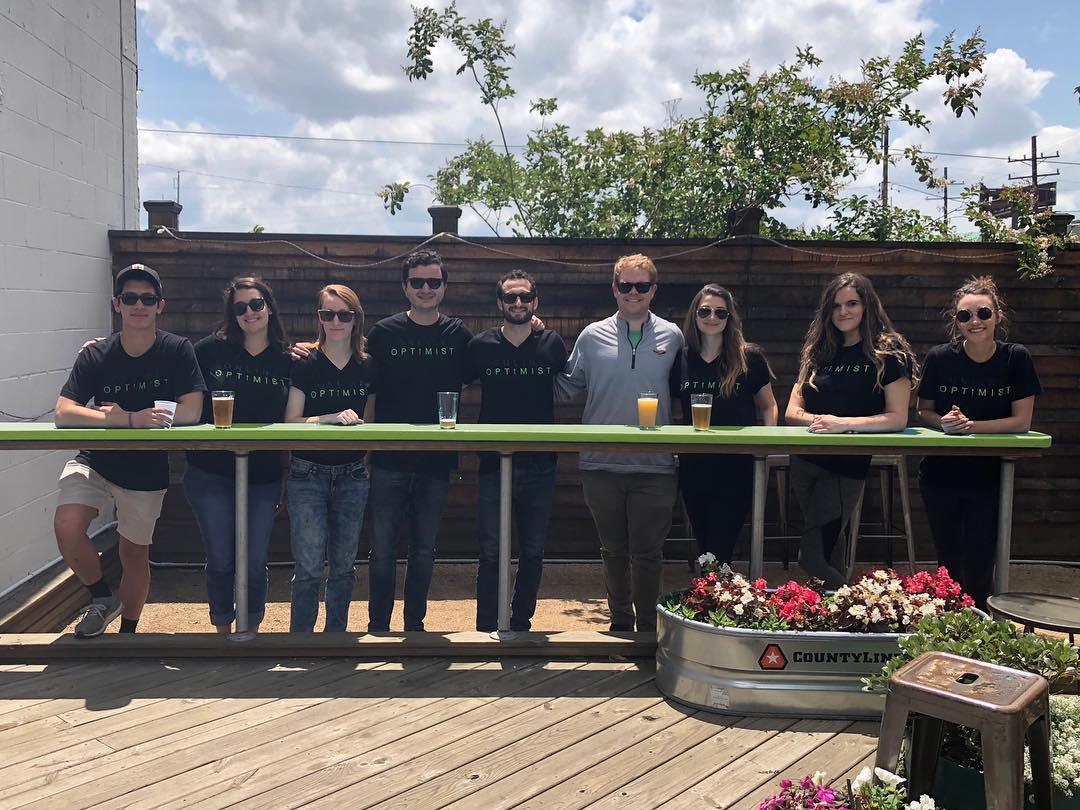How Millennials Get Over Imposter Syndrome
Online Optimism is your typical startup company in many ways. Like most startups, the average age of employees is quite young—our average age is around 25 years, to be exact. That said, this company is comprised of millennials who are quite confident with the successes they’ve had as powerhouse marketers in New Orleans. But as confident as all of us are, we sometimes have to take a step back and overcome the dreaded imposter syndrome that seems to plague employees in our age group.
 For the most part, we do a pretty good job of combating imposter syndrome. We each took a quiz to see how imposter syndrome might affect us as a young agency, and we found that it didn’t have much of an impact on us. The quiz rates everyone on a scale of zero to 100. The lower you score, the less likely it is you have imposter syndrome, while a higher score indicates you might have it. Many employees in our office scored around 30, which is on the low end. However, there were some employees with slightly higher scores. They wondered how imposter syndrome might (or might not) affect them.
For the most part, we do a pretty good job of combating imposter syndrome. We each took a quiz to see how imposter syndrome might affect us as a young agency, and we found that it didn’t have much of an impact on us. The quiz rates everyone on a scale of zero to 100. The lower you score, the less likely it is you have imposter syndrome, while a higher score indicates you might have it. Many employees in our office scored around 30, which is on the low end. However, there were some employees with slightly higher scores. They wondered how imposter syndrome might (or might not) affect them.
You might wonder how some of us—even though we’re young—avoid imposter syndrome and maintain confidence. While there have been multiple conversations about this phenomenon in our office, we’ve done some research to help others looking to overcome the “fear of being found out.” We reached out to millennials outside our office for advice as well.
Optimistic Reminder: The fear of being found out doesn’t always have to be bad. Some millennials use imposter syndrome to their advantage to perform better on the job.
What Is Imposter Syndrome?
Before we go any further, we must answer the question, “What is imposter syndrome?” According to Wikipedia, imposter syndrome (alternatively spelled “impostor syndrome”) describes the experience of individuals who struggle to recognize the legitimacy of their accomplishments and are afraid that others will discover they are frauds. Those who are affected by imposter syndrome may have low self-confidence despite having brilliant achievements to put on a resume.
To see how others feel about this, we reached out to several workers within our generation. Imposter syndrome might drive some employees to work harder, but a number of millennials agreed that feeling like a fraud is detrimental to one’s career. Both creators of Babes & Beignets, a popular New Orleans blog, feel it has more negatives than positives. “This syndrome can cause you to have a lack of confidence, which could result in lack of respect and credibility amongst your co-workers and superiors,” Babes & Beignets said.
While having imposter syndrome is not always a bad thing, many believe it causes strain in the workplace. This is why people in the modern workplace must understand why it occurs and how to fix it.
Why Imposter Syndrome Is Common Among the Millennial Generation
Why does imposter syndrome tend to get the better of some millennials? Millennials, typically defined as those born between the early 1980s and the 1990s, are also sometimes referred to as members of the “trophy generation.” This is to say that the parents of our age group frequently alternated between praise and criticism while raising us. One moment our parents would get so excited about an achievement, such as earning a spot on the honor roll, then very heartbroken the next when they found out we were cut from the varsity team. Through these moments of celebration and disdain, millennials learned that in order to get cool things, they had to do the “right” things. Doing the wrong things would ultimately lead to a loss of cool things.
As we grew up and entered the workplace, these feelings never quite went away. Upper management at most companies rewards top employees for their achievements and reprimands underperforming employees for poor performance. When a millennial sits next to a seemingly “higher-achieving” employee, they might find themselves comparing their performance to that of the other employee. This is because they’re hoping to receive the same respect the “higher-achiever” does.
For instance, according to Maggie Robert, co-creator of Babes & Beignets, there’s a lot of pressure today to hold a side hustle outside your usual 9 to 5. “I actually read a study when preparing for [our NOEW speech] that millennials who do not have a side hustle are beginning to feel inadequate because it has become such a norm,” Maggie said. “It’s easy to feel this way when you look at the world around you and everyone [else seems to be] doing cool things.”
Unlike older generations, millennials can more easily view the lives of those around them through social media. As a result, we see all the “cooler” things our peers are doing and feel as if we need to do more to be considered achievers. This itself is another reason for the prevalence of imposter syndrome in our generation.
Side Note: Our agency offers social media marketing services and fully recognizes the importance of social media for businesses as well as influencers. But when it comes to personal use, we recommend users take a step back and do not use social media as a tool to compare themselves with others!
We reached out to a number of other employees our age to find effective ways to use social media without social comparison. We got feedback from many, but the most inspiring words we heard were from Ali Larrick, a spin (indoor cycling) instructor in Brooklyn, New York. Ali, who teaches at Byklyn, spends all day at her job teaching clients that they can do it. Many of them are trying to live up to an ideal they see on the Internet, but Ali reminds them to see Instagram solely as a tool for self expression.
“Learn to stop comparing yourself so you can live YOUR best life,” Ali said. “Think of [Instagram] as a platform for creative expression, and then get back to your grind.”
As a team full of Instagram creators, we also agree that this tool is simply great for expressing yourself.
Finally, those from previous generations tend to have more vertical career paths. Our CEO, Flynn Zaiger, noted that many people in our generation—including those in our own office—have had less vertical career paths. While our parents might have worked their way up in their chosen career fields to executive titles from associate-level positions, many millennials have bounced around. Among our current staff, we have a director who never thought they’d end up in advertising. Another director of ours worked across many industries and had no clear career in mind during college. According to Flynn, this is a result of the job market being so tight as our generation was graduating from college, which meant that many graduates did not end up in career paths related to their college majors.
How We Cope with Imposter Syndrome
 It’s just as important to understand why imposter syndrome happens as it is to cope with it. Imposter syndrome is both controversial and uncomfortable for our generation, which is why Online Optimism implements practices to overcome it. Here’s what we (and some of our millennial peers) do to cope:
It’s just as important to understand why imposter syndrome happens as it is to cope with it. Imposter syndrome is both controversial and uncomfortable for our generation, which is why Online Optimism implements practices to overcome it. Here’s what we (and some of our millennial peers) do to cope:
We Emphasize Each Other’s Expertise
At Online Optimism, our team is comprised of a dozen people who do all the work. That said, we believe that job placement and hiring must be done carefully. We understand that not everybody can handle every job that exists, so that’s why we hire certain people to do certain things. If somebody has been hired for a certain job, chances are that person was the best person to do it. Flynn believes that each employee should be proud of their areas of expertise.
“We emphasize to our employees that they are experts in their field [when we hire them], and I really do believe that really for better or for worse,” Flynn said.
Emphasizing these things to our employees makes them own their crafts and feel like they can perform any task to the best of their abilities. When these employees don’t perform as well, we provide feedback letting them know. Constructive criticism is never meant to upset an employee: it’s only to put them back on the right track. When an employee gets back on the right track, we acknowledge it, which builds their confidence even more.
We Focus On Actual Accomplishments
One practice we follow at Online Optimism is “weekly wins.” Going out for lunch together on Friday is a major part of our company culture. Rather than thanking Flynn for covering the cost of our meals and appetizers, we thank people in our office for accomplishing “weekly wins.” But they only get thanked if they’ve helped us grow as a company that week. In order to receive a weekly win, you must do something that helps the company move a step in the right direction. While these might sound like more participation trophies from the trophy generation, nobody who just “does their job” will ever earn a weekly win. Online Optimism does not reward employees for “coming in last.”
We Focus On Continued Growth
Online Optimism was started in 2012 by just one man, his coffee, and a laptop—that’s it. As it continued, our company has grown on profit alone. We’re now able to hire three to four specialists each semester, grow in clients each month, and maintain an office that our staff enjoys coming to every day. With growth like this, it’s always important for us to look back on how far we’ve come, not just look at how far we have yet to go.
A number of people we talked to about imposter syndrome also agree that it’s important to see how far you’ve come since the beginning. “When you’re young and starting out in your career, you have to just accept that you don’t know everything,” Alessandra Madrid, co-founder of Babes and Beignets, said. “No one became a CEO of a multi-million dollar company overnight.”
We Focus On Remaining Humble
Although we work in marketing, an industry that attracts many millennials, we believe it’s important to stay grounded no matter how quickly you find success in your career. We create work that speaks to large audiences, so staying humble and not fishing for compliments will always be important. As Flynn puts it, “Very few people tell you that you’re successful when you are.” No matter how far we come as marketers, it’s likely we will be treated the same way we were treated when we started. We must honor staying grounded in our work.
Why Is It Important to Overcome Imposter Syndrome in the Workplace?
 The coping strategies mentioned above are important, because imposter syndrome could be a detriment to an employee in many areas of their life—not just in the workplace. An employee might find themselves struggling in their personal life if they don’t properly deal with imposter syndrome in their professional life. A bad relationship with a job might wear them out.
The coping strategies mentioned above are important, because imposter syndrome could be a detriment to an employee in many areas of their life—not just in the workplace. An employee might find themselves struggling in their personal life if they don’t properly deal with imposter syndrome in their professional life. A bad relationship with a job might wear them out.
As Taylor Stano, a millennial sales representative at Metal Supermarkets in Cincinnati, Ohio, told us, “I think Imposter Syndrome can be hurtful in the workplace. It can take a toll mentally and physically on an individual. This self doubt can build a tremendous amount of unnecessary stress and could possibly lead to being burnt out from work and personal activities.”
Being confident and happy at work isn’t the only factor influencing your happiness outside work, but it can only improve both areas of your life.
What Are the Benefits of Imposter Syndrome?
While imposter syndrome often comes with two major risks—losing respect from coworkers and worsened mental health—it can come with a couple of benefits. Those currently struggling with imposter syndrome can use it to get better at their jobs. Dr. Elizabeth Hendrickson, a journalism professor at Ohio University who has worked in fashion journalism, agrees.
“They are likely better listeners, as they are [hopefully] trying to learn from others,” Dr. Hendrickson said. “Also, they tend to set higher standards for themselves in terms of goals and outcomes.”
So whether you have imposter syndrome or not, it’s important to remember that it can be used to your advantage. Just take it one day at a time. Careers can be long and meandering, but each day is a learning experience and a chance to become a better expert at something. Just remember how far you’ve come, and your thoughts of imposter syndrome might begin to fade.
